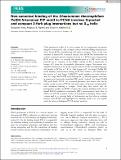Non‐canonical binding of the Chaetomium thermophilum PolD4 N‐terminal PIP motif to PCNA involves Q‐pocket and compact 2‐fork plug interactions but no 310 helix
Abstract
DNA polymerase δ (Pol δ) is a key enzyme for the maintenance of genome integrity in eukaryotic cells, acting in concert with the sliding clamp processivity factor PCNA (proliferating cell nuclear antigen). Three of the four subunits of human Pol δ interact directly with the PCNA homotrimer via a short, conserved protein sequence known as a PCNA interacting protein (PIP) motif. Here, we describe the identification of a PIP motif located towards the N-terminus of the PolD4 subunit of Pol δ (equivalent to human p12) from the thermophilic filamentous fungus Chaetomium thermophilum and present the X-ray crystal structure of the corresponding peptide bound to PCNA at 2.45 Å. Like human p12, the fungal PolD4 PIP motif displays non-canonical binding to PCNA. However, the structures of the human p12 and fungal PolD4 PIP motif peptides are quite distinct, with the fungal PolD4 PIP motif lacking the 310 helical segment that characterises most previously identified PIP motifs. Instead, the fungal PolD4 PIP motif binds PCNA via a conserved glutamine that inserts into the Q-pocket on the surface of PCNA and with conserved leucine and phenylalanine sidechains forming a compact 2-fork plug that inserts into the hydrophobic pocket on PCNA. Despite the unusual binding mode of the fungal PolD4, isothermal calorimetry (ITC) measurements show that its affinity for PCNA is similar to that of its human orthologue. These observations add to a growing body of information on how diverse proteins interact with PCNA and highlight how binding modes can vary significantly between orthologous PCNA partner proteins.
Citation
Yang , D , Alphey , M S & MacNeill , S 2022 , ' Non‐canonical binding of the Chaetomium thermophilum PolD4 N‐terminal PIP motif to PCNA involves Q‐pocket and compact 2‐fork plug interactions but no 3 10 helix ' , FEBS Journal , vol. Early View , 16590 . https://doi.org/10.1111/febs.16590
Publication
FEBS Journal
Status
Peer reviewed
ISSN
1742-464XType
Journal article
Description
Funding: Carnegie Trust for the Universities of Scotland (Grant Number(s): 70668). Chinese Scholarship Council.Collections
Items in the St Andrews Research Repository are protected by copyright, with all rights reserved, unless otherwise indicated.

